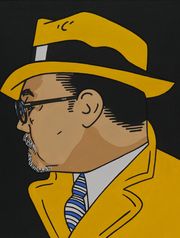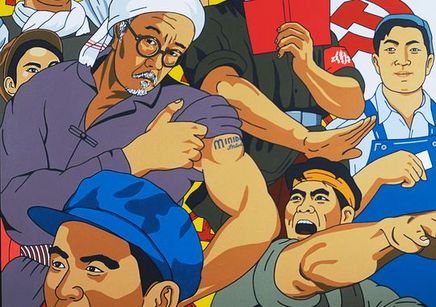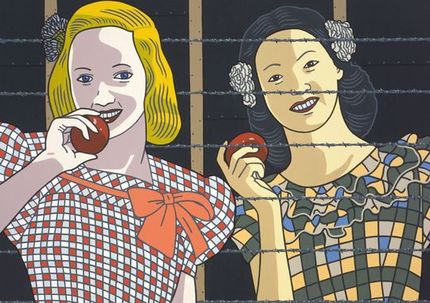- Home
- Bio
- Series
-
Projects
- Meta Paper Cut Mural
- Contemporary Cambodian Art
- Burke Museum Residency
- Denver Night Lights/Ukraine
- Redmond Sound Transit
- Seattle Storm Signal Box
- Nuclear Sculpture
- Densho Memory Net of Remembrance
- Plymouth Housing Mural, Seattle
- Federal Way Sound Transit Mural
- Denver Billboard
- 2nd Ave Sign Project
- Factory Phnom Penh
- Densho Artist-in-Residence
- Oneness for Cornish
- Tsuru for Solidarity
- City of Bellevue Portable Art Collection
- Washington State Arts Commission
- Siem Reap, Cambodia Public Installation
- "Public Art Comes to Your Front Yard"
- "Shoreline Banners" Public Art
- Events
- Contact
- Press
 “Roger Tracy” by Roger Shimomura is featured in “Roger Shimomura: An American Knockoff” on exhibit at Hallie Ford Museum of Art Jan. 17 through March 29. Shimomura’s art was influenced by the pop culture and comic books of his youth.(Photo: Courtesy of Museum of Art, Washington State University) “Roger Tracy” by Roger Shimomura is featured in “Roger Shimomura: An American Knockoff” on exhibit at Hallie Ford Museum of Art Jan. 17 through March 29. Shimomura’s art was influenced by the pop culture and comic books of his youth.(Photo: Courtesy of Museum of Art, Washington State University) Tom Mayhall Rastrelli, Statesman Journal 5:19 p.m. PST January 15, 2015 Artist Roger Shimomura's earliest memory is of his third birthday in 1942. Born in Seattle, he was with his family in the assembly center at the state fairgrounds in Puyallup, Wash. But they weren't there for cotton candy. They were prisoners living in horse stalls waiting to be corralled onto trains and banished to the Japanese internment camp in Minidoka, Idaho. "They were in such a rush to get us behind barbed wire that the camps weren't ready yet," Shimomura said. "They just built floors right over the dirt saturated with cow and horse manure. That stench was permeating."  “Chinese Imposter #5” by Roger Shimomura confront the stereotype that all Asians are the same. In the painting, Shimomura’s garb matches that of the Chinese men surrounding him, but he is showing a Japanese tattoo. “Roger Shimomura: An American Knockoff” is on exhibit at Hallie Ford Museum of Art Jan. 17 through March 29.(Photo: Courtesy of the Greg Kucera Gallery) “Chinese Imposter #5” by Roger Shimomura confront the stereotype that all Asians are the same. In the painting, Shimomura’s garb matches that of the Chinese men surrounding him, but he is showing a Japanese tattoo. “Roger Shimomura: An American Knockoff” is on exhibit at Hallie Ford Museum of Art Jan. 17 through March 29.(Photo: Courtesy of the Greg Kucera Gallery) For three years, Shimomura, his family and more than 110,000 Japanese Americans were imprisoned. Shimomura said the mistake that America made of not being able to distinguish between Japanese enemies and Japanese Americans during World War II forever shaped his life, work and parents. "They paid for it dearly. Two or three years out of their life erased," Shimomura said. "I think it screwed up my parents' generation in a major way. I think they lived with an inferiority complex the rest of their lives. They were so afraid of being themselves because they were punished for that. I never had Japanese things around me when I was growing up because my parents were afraid." One thing Shimomura did have around him in his youth were comic books. Dick Tracy, Popeye and Superman filled his childhood imagination. "I never read comic books," Shimomura said. "I collected the ones I wanted to look at.  “Classmates #1” by Roger Shimomura is featured in “Roger Shimomura: An American Knockoff” on exhibit at Hallie Ford Museum of Art Jan. 17 through March 29.(Photo: Courtesy of the Museum of Art at Washington State University) “Classmates #1” by Roger Shimomura is featured in “Roger Shimomura: An American Knockoff” on exhibit at Hallie Ford Museum of Art Jan. 17 through March 29.(Photo: Courtesy of the Museum of Art at Washington State University) "As a painter, print maker, and performance artist, Shimomura's range of work addresses the sociopolitical issues that have shaped his life experiences as a third generation American of Japanese descent," said John Olbrantz, Hallie Ford's director. "His remarkable body of work acts as a powerful and compelling self-portrait and window into the Asian American experience." Shimomura named his last series "An American Knockoff" after his experience of never quite being accepted as an American. "Something that Asian people suffer in this country, the presumption that they're foreigners," Shimomura said. "That's sort of the definition of a knockoff." Read the full article
0 Comments
Leave a Reply. |
AuthorLauren Iida Archives
April 2016
Categories |
 RSS Feed
RSS Feed